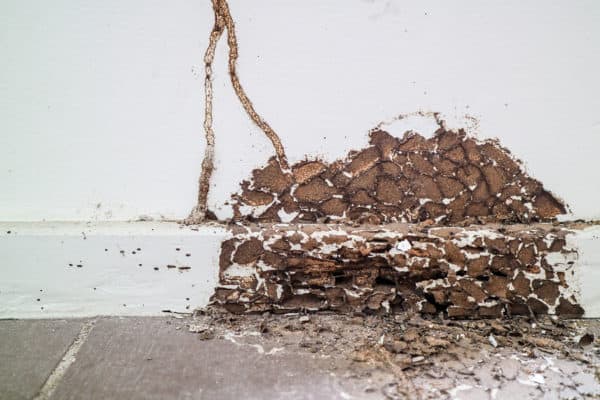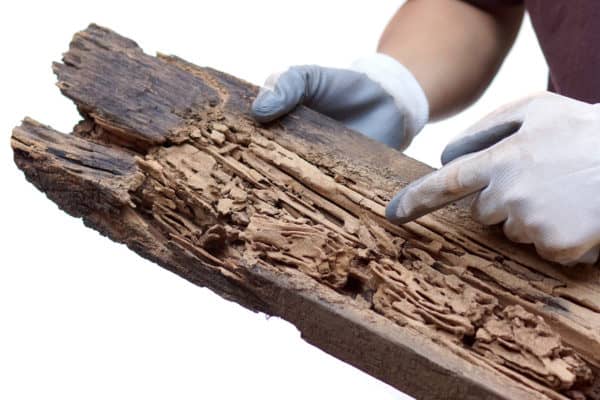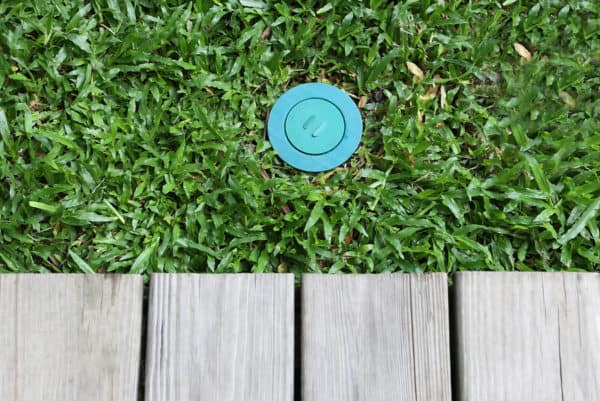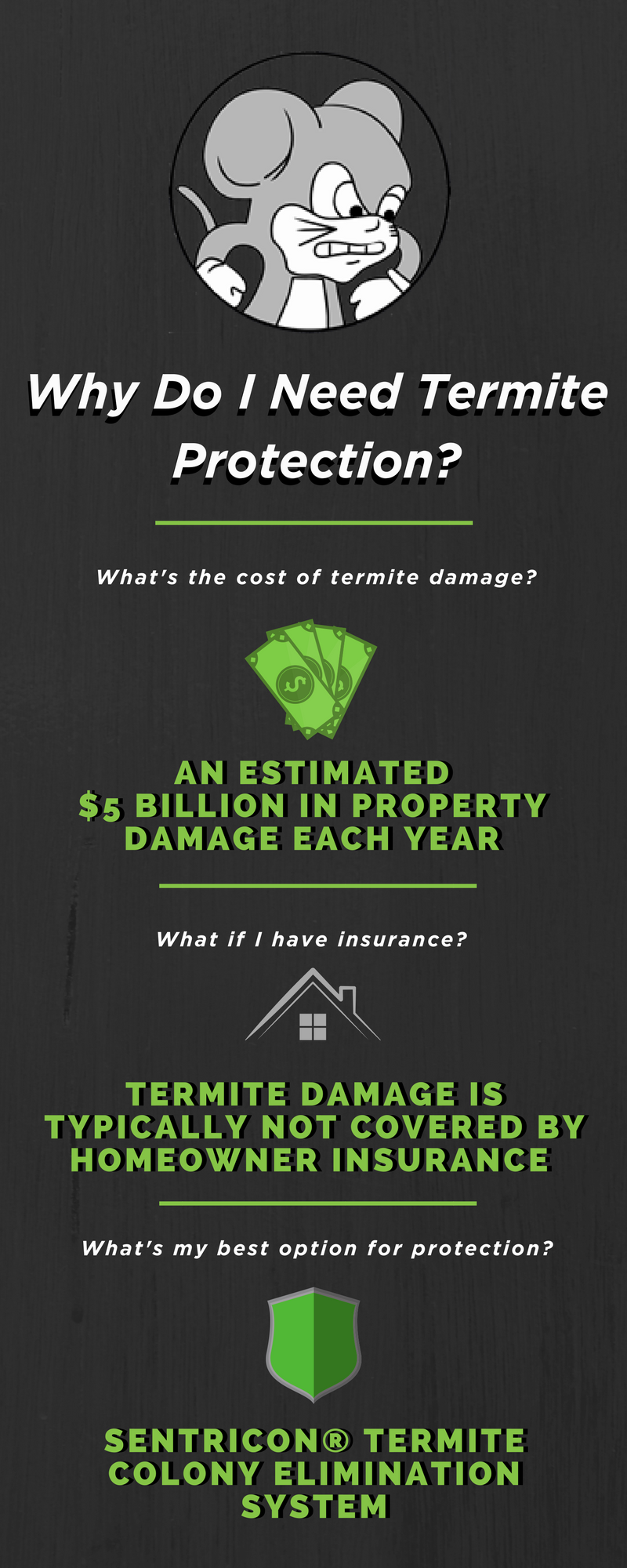READY TO GET STARTED?
REQUEST A FREE ESTIMATE
Fill out the form below or call (888) 466-7849 for a free, no-obligation estimate.

Owning a home is a huge responsibility. There are so many things to consider, but when making that list of important items, termite protection should be in the top 5. Termites cause an estimated $5 billion in damages each year in the U.S., and most homeowner insurance policies do not cover damage caused by termites. Additionally, if you are looking to sell your home, the seller is usually responsible for covering the damage during the sale of the home. Knowing all this, let’s look at what you can come to expect in your first year of choosing to invest in termite protection.
A comprehensive inspection of your property is done by a certified pest professional. They will look for signs of any existing or previous termite infestations and damage. After this is completed, they will go over their findings and best recommendations on the protection and warranties available for your home.
Once you’ve made your choice and signed on the dotted line, your local office will schedule your installation day. A licensed termite control professional will come out and strategically install your termite protection system. When they have completed the installation, they will go over what was completed and walk the property with you to make sure everything was completed to a standard to which you expect.
The best part about investing in a bait system like Sentricon is cutting out the need for continuous visits and worry. Since the bait is cellulose-based and combined with a slow-acting pesticide, it works 24/7. A year after your installation, your licensed termite control professional will come back out to check every station for signs of termite activity.
Choosing the right direction for you when it comes to protecting your most important assets is a big decision. If you still have more questions, give us a call. We’ll schedule your FREE home inspection to give you all the tools to decide.

Just as the weather changes with the seasons, pest activity shifts to usher in new groups of active pests. Let’s take a look at what pests are active in your area and some tips to keep them away.
The humidity and moisture that come with early summer is what helps to increase subterranean termite activity. “Swarm season” is in full effect, and this can present a problem for your home.
Summer is the biggest travel time for many. College students are coming back home, and family vacations are planned. This increases the chances of having an incident with bed bugs, and a bed bug infestation is no easy battle.
As the summer weather starts to rev up, American cockroach activity will skyrocket. While they live outdoors, if they find themselves low on food or if the weather experiences a drastic change (extreme heat or excessive rain), they will try move indoors.
Pest infestation can be costly and a major hassle. Contact a professional pest control company like Northwest for a free pest control estimate to protect your home from pests year-round.

Termites cause billions of dollars in damage each year. There are two main types of termites: drywood termites and subterranean termites. Drywood termites are found in warm, southern climates. They establish their colonies deep within the wood that they eat. As they consume wood, they create mazes of tunnels and chambers within the walls and foundation of your home. Subterranean termites are found throughout the continental United States. These termites build their colonies underground and emerge in search of food. They can enter your home through cracked or unsealed foundations.
Because termites eat wood from the inside out, termite damage often goes undetected for long periods of time. Often in fact, by the time signs of termites appear, colonies are well established and significant damage has already been done. Because of this, it is recommended that you get a termite inspection at least once per year or any time you find signs of termite activity. The average termite inspection cost is usually free (if no termite report is required, as in the case of a real estate transaction), or can be anywhere from $45 to over $100 depending on the size of your home and the exterminating company hired. A licensed termite inspector will perform a visible inspection on the readily accessible areas of your home looking for evidence of termites. The inspection should include a visual inspection of the entire interior of the home (including crawlspace and basement) and the exterior of the property. If evidence of termites are found, a termite exterminator will be required to provide appropriate termite control options and treatment.
Spotting signs of termites is a good indicator that a well established colony is nearby. But what are these signs? What should you look for? Here are 6 common signs of termites:
If you suspect you have a termite problem or if you spot signs of a termite infestation, contact a professional termite control company who can provide you with a thorough termite inspection and a comprehensive termite protection and treatment plan.
Summer Wildlife Removal: Common Home Invaders
What Are These Little Black Ants?

Termites can be a homeowner’s worst nightmare. Termites do their damage from the inside out and they often aren’t detected until after significant destruction has already been done. The signs of termites are often difficult to find until colonies are well established. In fact, termites cause an estimated $5 billion in damages each year in the United States. Yet many people still question if termite protection is worth the cost.
Structural damage caused by termites is the most expensive with an average cost of $3,000 for repairs. This amount varies depending on the extent and location of the damage that is caused. In addition to the structural damage caused by termites, cosmetic damage can also require repairs, costing an estimated $2,000 to fix things like discolored sheetrock, buckled floors, and peeling paint. This amount also varies depending on the materials that were damaged and the materials used to repair or replace it.
Termites must be exterminated before any repairs are done. The cost of a termite treatment not only include the termiticides or baits used in the treatment, but also the labor, training, and service hours for the termite exterminator. The average cost of termite control is $4 to $7 per linear square foot of your home. This estimate also varies based on the type of termite warranty provided, the location of your home, and the type of treatment required.
Unfortunately, most homeowner’s insurance policies do not cover termite damage and sellers are usually responsible for covering termite damage during the sale of a home. This can vary so it is always a good idea to check your state regulations. This also usually includes a termite inspection prior to the sale of the home.
Knowing the potential costs of termite damage and repair is reason enough to invest in termite protection. What options do homeowners have when a homeowner’s policy doesn’t cover termite damage? A termite bond or termite warranty is your best bet. A termite bond is a warranty between a homeowner and a termite company that functions as a maintenance contract for termite prevention, damage, and repair. Termite warranties vary by company, but they generally include an agreement for annual (or more often) termite inspections during the lifetime of the warranty, an agreement to provide treatment if termites are discovered (often at no additional charge to the homeowner), and in some cases an agreement to repair damages. Not all homes, however, qualify for these repair bonds so always check with your termite control provider about this.
A termite warranty provides you with peace of mind against termite damage. The warranty guarantees that the pest control company will continuously inspect your home and make sure that new infestations are discovered before they can proliferate. Termite warranties are also beneficial when buying or selling a home as they are often required before a sale can occur. Lenders will often not approve mortgages for at-risk homes without a termite bond. Only certified pest control companies can issue termite warranties. Yearly costs typically run $300-$400 for the warranty coverage, which includes the annual termite inspection.
Click here to schedule a free termite inspection.
What is the Difference Between Traditional and Green Pest Control?
Termite season is here! You may be seeing many ads for termite protection for your home, but you’ve gone years without termite protection. Is it even worth it?
Well, let’s look at the facts when it comes to termites and your home.

While you may not notice any signs of termite damage in your home currently, that doesn’t mean there’s not a silent, ongoing termite infestation causing damage to the structural integrity of your home. By having your home inspected, you may be able to catch the damage before it’s too late or prevent damage from ever impacting your largest investment.
When you sign up for Northwest Termite Service, here is what you can expect:
Don’t wait until you’re stuck with an insurmountable repair bill. Call (888) 466-7849 and set up a free termite inspection today!